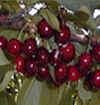|
FRUIT LIST LINKS
Ordering Info & Guarantee Policy
|
CHERRIES
The plant nursery has closed for retirement. Bill Ford is available for consultation and presentations. Call 706-273-8295 Please feel free to use the following pages for reference. We thank you for your pratronage through the last 26 years. Happy gardening!
SWEET CHERRIES
Black Tartarian
An excellent pollinator for other sweet
cherries. The fruit are sweet, juicy and rich. They ripen early to form a
large reddish-black cherry. The tree is vigorous and
erect bearing at an early age. Ripens in early July.
Zones 5-7.
Hartland
Hartland is an early-mid season black sweet
cherry. Consistently productive crops heavily and bears annually. Fruit are
medium to large, frequently nearly one inch in diameter. Tree
is vigorous and uniquely spreading in habit.
Zones 5-7.
Sandra Rose
Self-pollinating, the Sandra Rose is highly
regarded for it's sweet flavor. Fruit is dark red, round with moderately firm
flesh.
Appears to have good tolerance to splitting
Ripens in July.
Zones 5-7.
Ulster
PIE CHERRIES
Balaton
Balaton® is larger, sweeter and firmer than the older Montmorency. The flavor is
mildly tart (not sour), making it suitable for fresh eating. The vibrant red color
makes it excellent for juice, preserves, jelly and pies. The tree is
self-pollinating, quick bearing, grows vigorously and should be trained
as a sweet cherry tree. Ripens the last of May. Zones 5-7a.
Known as "the pie cherry", this fruit is an easy to grow variety,
requiring little spraying. Self-fruitful
and quick bearing, it ripens the last of May-early June.
Zones 5-7 and parts of 8.
A naturally dwarf tree growing to about 7ft., North Star is also
Self-fruitful and winter hardy, it
ripens the late June, early July. The fruit is red and tart, perfect for pies, preserves and
jellies. An excellent tree for the home gardener with limited space.
These luscious fruit are delicious eaten fresh as well used in many recipes for
baking, jams, ice cream, candies, wine and more. An excellent source of
Vitamin C and antioxidants, and many people swear by the gout relieving
properties of the darker cherry varieties.
Cherry trees offer a spectacular show of blooms in the spring that mature
quickly to luscious red fruit in the early to mid summer. Fall color can range
from yellow to orange-red. The trees should be planted in a sunny location with
well drained soil. Soil pH needs to be at least 7.0, so most soils will need
added lime. The cherries we offer are noted as needing cross pollination or
self-pollinating , but will set a better crop with another variety; sweet with
sweet, tart with tart. Prune to open vase shape in early spring before buds
begin to break. In general, treat the cherry tree like a plum tree.
All varieties are on standard rootstock because we have not found a reliable
dwarf rootstock that is long lived. A more dwarf size can be maintained with
proper pruning.
|
|
